April 9, 2020
A Conversation With Tara Henley
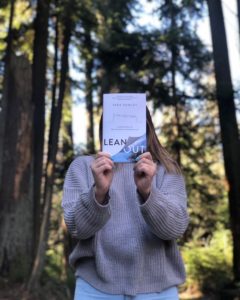
Like many of you, I found myself unable to read as this crisis arrived in our lives, perpetually in a panic, scrolling news feeds instead. Not being able to read, however, only compounded the trouble I was in, because if I’m not a reader, then who am I? And it was Tara Henley’s new memoir LEAN OUT: A MEDITATION ON THE MADNESS OF MODERN LIFE that brought me back to books again, a gorgeously written memoir that is perfectly timed for our current moment. Henley was kind enough to answer some of my questions about the book, so please read on to learn about how Madeleine L’Engle’s books expanded her vision for her life, what are the limits of self-care, and how “right now we’re seeing in stark terms the price we all pay for inequality.” I love this book so much.
April 8, 2020
How to Pronounce Knife, by Souvankham Thammavongsa

Make your book pink. Make your book slim. Put a nail file on the cover, and have your reader forget that it’s actually a blade, and this is how you do it, create a story collection that seems unassuming but will cut you with its razor edge. The “Yes, Sir” delivered in a tone that really means, “Fuck you!” And it gets under your skin, of course, a book like this, Souvankham Thammavongsa’s fifth book after four acclaimed poetry collections and her debut fiction, the short story collection How to Pronounce Knife. (Full disclosure: the writer and I were classmates twenty years ago, and I since followed her career with admiration.)
These stories are subtle, wonderful and jarring. They range between those from the perspective of children of immigrant families from Laos (reflective of Thammavongsa’s own background), children who are know before many of their classmates the way that parents are actually fallible after all, that they struggle and have limits, and stories of people awkwardly navigating social and romantic mores, failing to fit in with convention (which is another way of not failing at all—especially in a story).
In the title story, a child takes her father’s guidance on the correct way to pronounce “knife,” and learns the lessons of a lifetime in the process. In “Paris,” a woman who works in a chicken factory dreams of getting a nose job—and experiences vicarious heartbreak. A seventy-year-old woman has an affair with her young neighbour in “Slingshot,” a story with the most perfect, powerful ending.
I LOVED “Randy Travis,” the story of a family who immigrates from Laos, and the mother falls in love with country music, which helps define for her a different kind of life she desires for herself. In “Mani-Pedi,” a failed boxer who ends up with no choice but to take a job at his sister’s nail salon—but who insists on keeping his dreams. “Chick-a-Chee” is about one family’s embrace of a bizarre local ritual. “The Universe Would Be So Cruel,” awesome and heartbreaking, about a man who runs a small print shop and has an uncanny knack for knowing the future for the couples whose invitations he creates. A child considers the mystery of her mother in “The Edge of the World.” A school bus driver realizes he’s losing his wife in “The School Bus Driver.” A mother watches her daughter from afar in “You Are So Embarrassing.” The story “Ewwrrrkk” begins, “The summer I turned eight, my great-grandmother showed me her boobs.” An accountant looks for love (and potential clients) in “The Gas Station.” A childhood friendship is recalled in “A Far Distant Thing.” And a young girl goes to work with her mother in the final story, “Picking Worms.”
The stories are quiet but powerful, the sentences extraordinary, the volume as a whole is such a pleasure to read and to discover.
April 8, 2020
What’s Your Blogging Challenge?
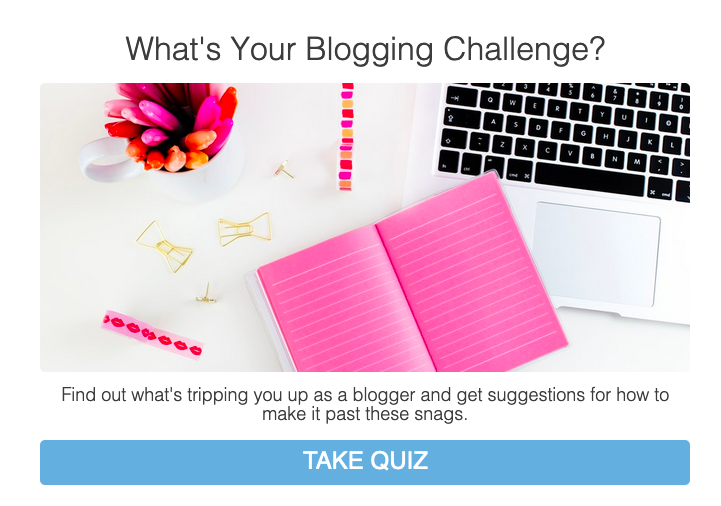
Looking for a diversion? How about a quiz? In which I nail your biggest challenge in blogging, and give suggestions for how to overcome that challenge and achieve your blogging goals.
April 7, 2020
Gleanings
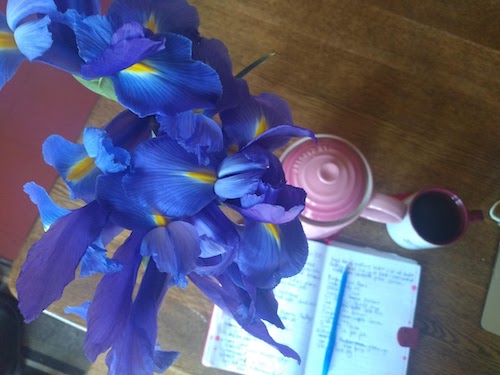
- how to make a log cabin while sheltering in place
- The exceptional does not faze us.
- “Gentle,” I told myself as I worked. As, I recognized, I have been telling myself for several weeks.
- the thing has to be read to be appreciated, otherwise I could as easily say frogs, bulrushes, English sparrow, landscape, polar ice, sunlight, rain, thunder, a gravel path, the egg cases of a praying mantis, the thin membrane of an onion, that sort of thing.
- I believe this is how we will all build the future of journalism: person by person, reporter by reporter, opportunity by opportunity, story by story.
- Is it possible to think of the time right now in some ways as holy or sacred? Where can we locate our “collective effervescence?”
- It would be easy to feel hopeless.
- Things turn out best for the people who make the best of the way things turn out.
- Given the times, given that we are keeping our distance, given that more people than ever are strolling along my usual routes by the river and other green spots in the city, I’ve been tromping along backstreets, down alleys, through what others might call the uglier parts of town.
Cool New Blog School Offering Coming Soon:
LET’S GET TOGETHER in June 2020
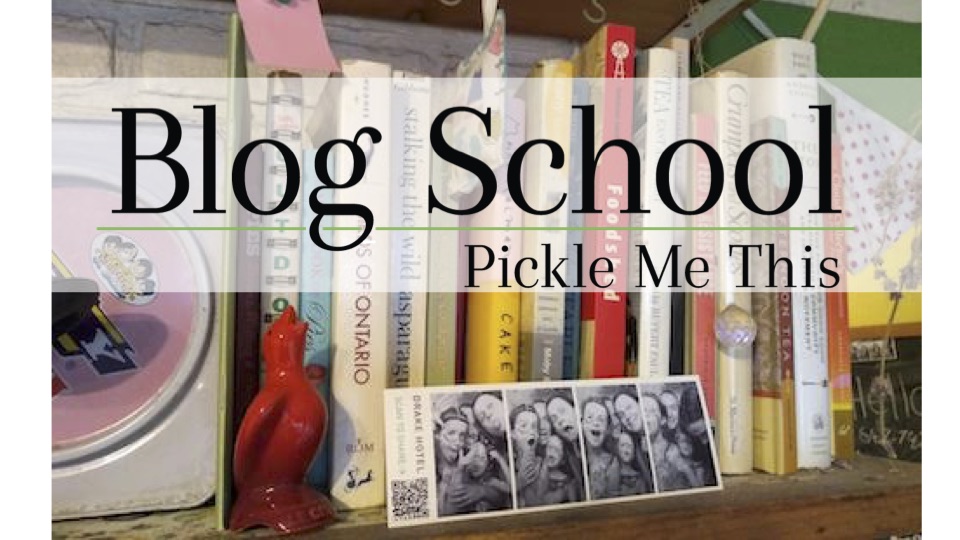
April 6, 2020
We’ve Still Got Weekends
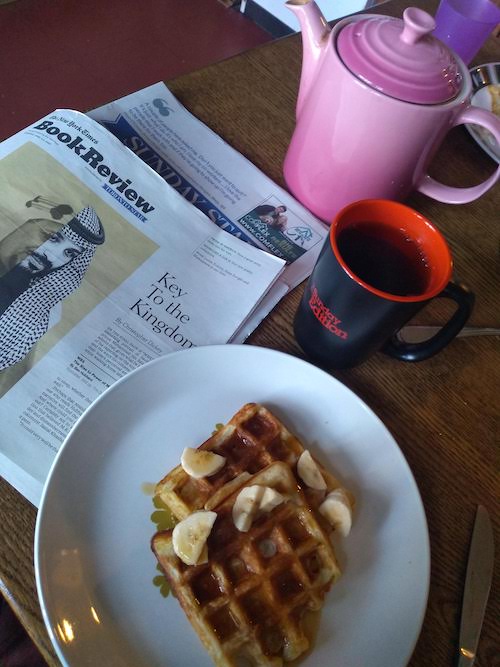
I wrote about “observing the weekend” on Instagram the other day, about the ways that doing so has helped to frame our lives in what is now the fourth week of quarantine during the time of Covid-19. Though it’s probably a good thing to do even at the best of times, and something that I didn’t do enough as I scrambled to finish my work during the brief hours my children’s school day provided and then had to fit in an extra shift or two on Sunday afternoons. And while my time to work is no more plentiful than it ever was (and now steeped in distraction, and anxieties, and I keep insisting on making elaborate lunches), the weekend has become a sacred thing.
On Friday afternoon, I turned my laptop off and didn’t turn it back on until Monday morning. All the weekday rules thrown out the window—dressed and breakfasted by 9am? Pshaw. If you’re not still in your pyjamas on Sunday, 1:30 pm, then you’re doing it wrong. All the breakfasts should be photogenic and totally delicious, and you’re only allowed to read the news if you’re reading an actual NEWSpaper, though you have to read the comics first. The last two Saturdays, we’ve ordered takeout, because a person should only have to orchestrate one photogenic meal a day. There has been a whole lot of sloth, and togetherness, and video games, and reading, which is a pleasure and a break, and makes you even want to pull yourself together once Monday morning rolls around.
Even better than observing the weekend though? Adding a little bit of weekend to the week. A few weeks back, Harriet was having a pretty tough time with our new arrangement of hiding in our house for the foreseeable future in fear of a deadly contagion (kids these days!) and decided that special breakfasts on Wednesday would add a little bit of the magic and delight that has retreated from our lives. We’ve also curled up for a family movie on Monday nights the last two weeks, which would never have happened in any other universe, and seems like a lovely kind of indulgence in this upside-down world.
April 2, 2020
No More Nice Girls, by Lauren McKeon, and Lean Out, by Tara Henley
Although almost everything I was reading a month ago seems kind of irrelevant now, Lauren McKeon’s No More Nice Girls feels like it could be an exception. This underlined by the number of Canadian politicians and public health officials who are women and spearheading efforts to fight and control what’s going on right now, women we are turning to for answers and reassurance, one of whom, Deputy Prime Minister Chrystia Freeland, shows up early in McKeon’s book as as “a new kind of power that’s completely, deliberately at odds with a very old, very masculine one.”
In her book, McKeon imagines what might be possible with a different kind of power, and writes about ways that people are imagining such things already, with all-women co-working spaces, the #MeToo movement, “identity politics of lonely, angry men” as a backlash to women’s power. She writes about how conventional power doesn’t tend to work for women when they achieve it, corporate achievement as an example, where the women at the top still have to contend with the same challenges that all women do—sexism, harassment, discrimination, violence, a gender pay gap. The ways in which women have to be “better than perfect” to be accepted, while any guy in a poor fitting suit seems to fit the bill. And the limits of #GirlBoss kind of power, which is the kind of individualized, status-quo sustaining power that the patriarchy likes.
It’s difficult to synopsize McKeon’s book, whose range is so wide. She writes about race and representation; economics and federal budgets; gender and the media; how technology affects our lives and what it means that so much of technology is created by men; feminist cities; online trolling (McKeon is author of F-Bomb: Dispatches from the War on Feminism, which I read and loved in 2017); and about numerous and inspiring ways that women all over the world are raising the bar and changing the narrative on traditional notions of what a life of a woman ought to look like. It’s an incisive and inspiring read.
*
I read No More Nice Girls in “the before times” and then was unable to read anything properly for a couple of weeks, as the world before my eyes was changed into a surreal and disturbing reality. And the book that finally brought me back to reading was Tara Henley’s Lean Out: A Meditation on the Madness of Modern Life. (Full disclosure: Henley wrote a kind and generous review of my novel back in 2017. We also share an editor. Neither of these factors are why I’m so obsessed with her book, but are definitely worth noting.)
Reader, this book was a balm, as it was always meant to be—but it meant so much more than it would have even a month ago. Suffering from physical symptoms of anxiety in 2016 after a decade of living in the big city and working in journalism, Henley reached a breaking point and realized that things would have to change—but also that she was limited as to what change was possible to her as an individual, this becoming even more apparent after she moves back to her hometown Vancouver and is confronted with the city’s unaffordability. Does modern life truly have to be like this, Henley wonders? A less solipsistic Eat, Pray, Love is how I am thinking about this book.
Lean Out is rich with reporting, but underlined by Henley’s own story and family history. (It’s also gorgeously written and inspired by the works of Madeleine L’Engle, which meant a lot to me after My Year of Vicky Austin.) She writes about alternatives to the way we do work, connect with nature, eat food, make and spend money, live online, combat loneliness, find community, and make our homes. Arriving at not definitive answers, but instead broadening the range of what is possible for a more fruitful way of living both as individuals and as a society. And, as with McKeon’s book, it all comes down to inequality in the end—data shows that unequal societies, Henley writes, make life demonstrably worse for everybody, even those who are at the “top.”
Which is something all of us should keep in mind as we think about what kind of world we want to live in “when all this is over.” I am so grateful to these authors who are already doing the work of imagining new and better ways of being.
*Both these books are included on a Books With Vision list I created at 49thShelf. And an amazing Q&A with Henley will be up on 49thShelf in about a week. Stay tuned. And buy her book in the meantime—you will be glad you did.
April 1, 2020
There will be school again, but in the meantime…
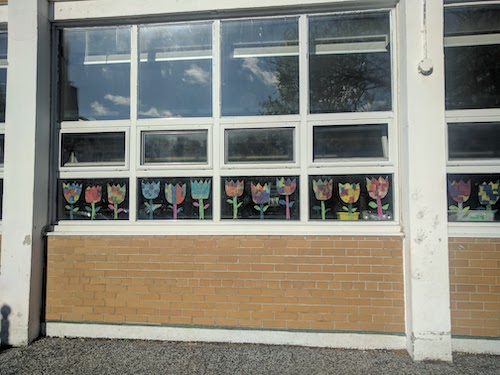
I love the things that my children learn at school, like how to read and write their names, do long division, and the geography of the Great Lake St. Lawrence Lowlands. Back before my children went to school, I had tried to teach them things, but none of it ever took. We received a letter before my eldest started kindergarten that suggested her knowing how to write her name before September might be an academic advantage, but she was having none of it. She’d already learned to write an H, and was quite adamant that this was sufficient, and her attitude toward this had me a little bit concerned as her academic career began, but it turned out that what she’d needed was a teacher, someone trained to educate (who knew!) and she eventually learned to write her name in its entirety, and then the whole alphabet, and the last time I checked, she was writing Warriors fan fiction, so it all turned out okay in the end.
Which is not to say that I’ve taught my children nothing. I’ve taught them to separate eggs, how to blow their noses, to sing the words to “Livin’ On A Prayer” and just what circumstances necessitate us to rue the patriarchy. I’ve done my best to teach them to be kind and decent people, to clean up their own messes, to care for others, and to stand up on the side of justice. I’ve taught them the name of birds and flowers and trees (often learning myself in the process) and to love hammocks, sunshine, and digging deep holes on the beach.
It’s the non-academic stuff they’ve learned at school, though, that’s been more important than all of this, even the holes and hammocks, and definitely the long division. I send my kids to school, and deliberately to public school, so they learn that they’re part of a wider community made up of all kinds of people. Going to school teaches them to be punctual, accountable, responsible, respectful. They have teachers they love, and teachers they love…a little less, and they learn that grown-ups, just like their peers, are all kinds of people. They learn how to get along with groups, they learn how to get along with people they don’t get along with, they learn that sometimes you’ve got to do things you don’t want to do, and that sometimes people are disruptive, and others are needy, and others are just totally obnoxious and will never get their comeuppance ever. They learn to return their library books, and not to forget their lunch boxes, and to do required reading, and to help out when assistance is asked of them. They learn that some kids have a little, and others have a lot, and that there is always going to be someone smarter than you are, and also people for whom things like school are a little harder. They learn to be patient. They learn to wait their turn. They learn to stand up for themselves, and for others, and when to let things go, and that there are rules, but not everybody is going to follow them, and sometimes you don’t have to either. The trick is when to know the difference.
And now school is out, for the foreseeable future, and everybody is going to have their own way of filling the gap. Some parents will relish the chance to introduce at-home learning, one’s “playing school” fantasies come to life, but with actual pupils instead of teddy bears. Others will be overwhelmed by the idea of keeping their children occupied, especially while balancing full-time work and other tasks, particularly in spaces that were not designed as daycare centres/offices. Some parents will rise to the challenge. Others will cry on the floor. And here’s my two cents: it doesn’t matter. Do whatever it takes to get you (all) through.
I am not a teacher. If I were a teacher, I’d be immediately de-certified, as attested to by the time I tried to teach my kids to ride a bike by screaming expletives at them. I learned my limits back when I tried and failed to teach my daughter how to write her name, and while my recollection is foggy, I was probably swearing then too. I am not patient. I am not nice. I am not remotely trained in how learning works and skills and knowledge are delivered. Teaching is hard. This is why I am not a teacher. If we tried to replicate the school environment right now, it would go very badly. And not just because of my character flaws even, or that I have work deadlines coming up, but also because everything in our current situation is so far from school that it’s sad, and maybe Zoom lessons have their purpose (my children are doing piano lessons via Skype that are going well so far!) but I can think of a million better ways for my children to spend their time.
Going to school is an opportunity for so much learning beyond the academic, as I’ve already noted. But so too is this moment in which school and everything has been suspended. To learn about science, and public health, and geography, and sociology, and leadership (an also its absence). To think about the different ways that this virus is affecting everybody so differently, from us who are cozy in our apartment to children who are precariously housed and who might not be safe at home. To think about community, and connection, and what it means to have to isolate ourselves from the people around us. What kind of society do we want to build when all this is over? (We had a conversation the other day about how so many things that would make the virus less dangerous—wider sidewalks, say!—would make things better for everyone.) Right now is an opportunity to cook meals together, and eat them properly at the table, and bake banana bread, and draw on the sidewalk with chalk. To read that book that’s been lingering on the shelf for years. To use all the art and science kits you’ve received for birthdays through the ages, but never had the time for. For puzzles, and YouTube karaoke, and reading comics, and having your mother tell you that “Only boring people get bored.” For observing the weather, and watching crocuses sprout in front of neighbours houses, and watching snails on the garden wall. For writing Warriors fan fiction, even, or reading poetry, or starting a blog. For building blanket forts, and Lego towers, and I’d even say learning to knit, but then I’d have to teach them, and you know how that is going to go.
For spending afternoons in the bathtub in your bathing suit (this was my husband’s idea—he called it a “bathternoon”), and planting seeds in egg carton soil, and reading random entries in the encyclopedia, and making collages out of old magazines, and drawing comics on the back of scrap paper, and learning about tarsiers (which apparently are nasty), and playing UNO, and Pokemon, and drawing city blocks on kraft paper, and watching clouds, and drawing trees, and making disappointing bath bombs from a kit. For watching movies, and TV, and riding scooters in circles on concrete pads which are far too limited for such things.
For learning about courage, and resilience, and sacrifice, and gratitude. For counting blessings, and thinking about how maybe we can distribute these more widely.
We will get through this. There will be school again. But in the meantime, there will be something different, and let’s not discount the educational value in what we’re all going through. As my perpetual fave Ann Douglas wrote the other day, “If our kids emerge from this crisis (a) feeling loved and supported by their parents; and (b) mastering some all-important coping skills, the truly important learning—the life learning—will be massive.”
March 31, 2020
Gleanings
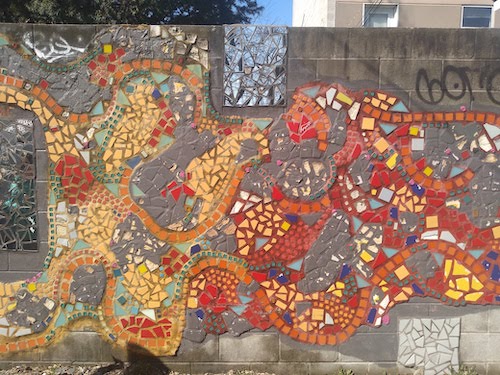
I made a list of Books With Vision whose authors imagine a different, better kind of world. If you’re looking for a book that’s relevant to read right now, here would be a good place to start. Hope you are keeping well.
- And yes we are watching numbers when what we are looking at are people, bodies, lives no more, deaths. Yes we are baking upside down plum cakes and eating salt and vinegar chips and worrying about our children. Yes we are finding it hard to concentrate.
- But what we do know, is that we’ve all navigated challenges, and that we’ll navigate this one, too.
- Tragic times call for extraordinary qualities. We are made for heroic realities.
- Finding our purpose is not a direct flight. I think, maybe, our purpose is the journey itself.
- That there’s no one I’d rather be cooped up with than my husband
- …two months ago, a positively bizarre time in which we entered and left our homes with abandon, casually hugged friends we were happy to see, and if our nose became itchy, we’d scratch it and not stand paralyzed in panic afterward. What salad days!
- I choose to see the silver lining, to embrace what is good and right.
- Such contrasts make life more interesting.
- Clare Hunter’s Threads of Life is a marvelous, inspiring, touching, and extremely wide-ranging account of the myriad ways needle crafts of all kinds have mattered and made meaning throughout history.
- Can making stuff amidst the mayhem REALLY improve our mental health?
- I guess it’s not a big surprise to me that Virginia Woolf is what I need right now.
- Let’s be okay with ourselves at our laziest, at our saddest, at our most vulnerable.
- Possibly the best bit of our day is the afternoon walk to the woods, and right now they are looking stunning, though the next best bit is the fields on the way up.
- Believe me when I say I started out intending to read The Miraculous Journey of Edward Tulane, just that one book. I couldn’t stop.
- And some day, I’ll be ready to begin my own work again. Not yet–not today. But soon. And until then, I’ll visit with old friends.
- Five things I am grateful for
March 26, 2020
What Are You Going Through?

“What are you going through?” is the question, a line from Shawna Lemay‘s Rumi and the Red Handbag (which I’ve included on a new list at 49thShelf of books in my library I want to reread). And it’s a particularly pointed question for right now, when we’re all going through it, when “we’re all in this together,” except we aren’t, of course. I’m still struck by the essay I read yesterday about a woman whose husband has been brutally ill with the Coronavirus, and this from the perspective of their teenage daughter:
“I took out the kitty litter,” CK says, “and I saw some people standing on the corner, and I was like, I want to see strangers! And then I heard them saying: ‘It’s actually been really nice. It’s been a chance to connect as a family.’ And I was like, No, actually, I don’t want to see strangers, and I came back in.”
My hardships pale. Compared to those who are ill, or caregiving, or grieving. Those who are unable to find childcare, or who are put to work in unsafe situations for minimal pay, or who struggling to put food on the table. For those whose support services have been cut, or whose lifesaving treatments have been cancelled. Compared to those workers who head into the eye of storm, while the rest of us are hiding in our houses. Even comfortably. Sheltering in place.
*
I had been freaking out about the Coronavirus for a while, since the end of February, waking up at night with anxiety, which seemed weird and almost laughable, but it kept happening. We’d been booked to travel to the UK last week, and I’d worried about travelling at such a heightened moment, about the coughs kids always have, and I’d been worried about us staying healthy before our flight anyway, which is a gamble at the best of times. We were applying hand sanitizer quite religiously, perhaps obsessively. On the last Monday before school ended, I had a doctor’s appointment, and friends were taking my children to their swimming lessons that night, and the anguish I was feeling at this situation was definitely out of proportion, though it didn’t help that I was sitting there in the waiting room with the 24 hour news channel screaming from a big screen.
Something wasn’t right, and I started seeing Twitter threads of devastation in Italy. We were leaving for the UK in less than a week, and cancelling our trip was just impossible. (So many things were impossible two weeks ago.) So much money on the line, and we couldn’t throw that away. (Since January, I’d been reading about people living under lockdown in China with absolutely no understanding that such things could ever been connected to me.) On Tuesday, I spent two hours on hold with the airline, only to be told that since there was no travel advisory, we weren’t eligible for a refund if we cancelled. What if we went then, I wondered, but ordered a boatload of face masks? I even looked them up on Amazon, which is anathema to me, but there was no availability anyway until early April.
By Wednesday it was clear though—things were bad. To travel to Europe would be lunacy, whether there was a travel advisory or not. I was starting to realize there was space between the lines of what public health officials were saying, that they were telling us we could go abroad…but that was not the same thing as saying we should. That there was really no one in charge here was something astounding to consider, but also that we had the power to use our own minds and make responsible choices. I did a panic shop that afternoon after picking up my kids from school, which sounds less shameful when you consider that I don’t have a car and had to carry home everything I purchased, and my children are still pretty excited about that trip to the grocery store “because you let us buy everything we wanted.” Mostly chips.
On Thursday, Harriet went to school, but we kept Iris home with a cough we would not have paid any attention to under normal circumstances. Over the course of the day, Stuart gradually stopped fighting my state of high alert and conceded that this was something. This was the day after all the sports were cancelled and Tom Hanks got diagnosed, and Sophie Trudeau the next day. I’d stayed up on Twitter late into the night, and then woke up in the middle of the night in a panic that was only abated by me going downstairs and turning my computer back on to discover that Twitter was not as terrifying as my mind was, which is really saying something.
I kept both kids out of school on Friday and Stuart worked from home, and it was here where our self-isolation began, and the idea of us ever having not cancelled our trip became hard to imagine. We were over it, though still profoundly disappointed, especially as Stuart’s dad has been very ill, and we were due to meet our baby niece, and it’s very hard to be apart from family with so much dire business going on. (This was also while the official UK policy was “Many people are going to die….”)
I could not eat. I wasn’t sleeping. I discovered that phoning friends was a lovely kind of reprieve, something I hadn’t done in years. I felt safe and comfortable at home, lucky for so many reasons, glad we’d done the panic shop early and avoided the rush. I felt overwhelmed by grief and sadness, and sorry for my children, and so much disappointment, and the idea of so much devastation still to come. The idea that nobody really understands what is happening, or how to fix it. Glimmers of hope too. Thinking of my relative comfort, and how to hold that in the same space as my fear for the future, but also awareness of the much more difficult situations that other people were going through. The nurses. The clerks at the grocery store.
I did not do very well last week. I kept calling it my roller coaster/ hamster wheel. I’d be doing a puzzle and have to go lie down because I was having a panic attack. The weight on my chest that is either anxiety or a deadly respiratory illness. I kept looking online, desperate for good news, but there was nothing, and I kept waking up at three o’clock in the morning, convulsively shaking. I was so scared, my body on high alert, and I had been right about everything, is what I was thinking. For weeks I’d been in a panic, and everything I was afraid of kept coming true.
And I keep thinking about all those people who are much more experienced at living with uncertainty than I am, how naive and silly I must sound. “Welcome to my world,” is what they’re all polite enough not to be saying out loud.
On Wednesday night, I watched Crocodile Dundee, which I can’t stop talking about, but it was such a turning point for me. I went to bed and slept all night, though waking up feeling okay in the morning made me not vigilant enough to resist indulging in behaviour I’d come to be sorry for, a whole afternoon refreshing Twitter, bad news and more bad news, and that night I went to bed and had legitimate nightmares. I started to see that feeling okay would have to be a conscious choice here, one that took more work than the submitting to the lazy river of media consumption (when will there be good news?). I’d spent too long scoffing at the idea of mindset and staying positive—what’s the use of that when everything is shit? But when everything is shit, I realized, mindset is all you’ve got, and being unable to eat or sleep, or get through the day without five panic attacks is not the way to stay healthy.
So what has helped me?
- Music! The radio is usually a constant soundtrack in our house, but lately it’s just upsetting noise. In very 20th century problems, our CD player broke last week, but then we finally signed up for ad-free Spotify and now I have all the music in the world at my fingertips.
- Avoiding the news: I was turning to the news for answers, but nobody has any of those (yet). Once a day or so, I will read the news online at a reputable source. I have stopped following charts and tallies. They are not helpful. Everything is bad. I know it. I don’t have to steep in it.
- No social media after dinner: The exception is Instagram, which is just wall-to-wall sourdough bread right now. Stupid movies and TV shows are good. Books are even better. Rereading Kate Atkinson’s Jackson Brodie books is the best thin ever.
- Counting my blessings. Even though this makes me feel guilty and I wish that blessings were more fairly distributed.
- Little rituals: good things to eat. Watching the sunset. Hugs with my loved ones. Talking to friends and family on the phone. Making food last longer. Making somethings out of nothings. Leaving chalk drawings on friends’ sidewalks.
- Connection! On Zoom, Skype, out the window, across the street, on the phone, etc. etc.
- Moving! This really helps me with sleep. I have been riding my exercise bike, which (another blessing!) mercifully I never got rid of, even though it’s been sitting in my closet for four years. Taking walks when we can. We’ve also done a couple of online fitness classes, and I really loved these (especially when the instructor’s cat walks in…)
- Feelings check-in—and sharing my feelings with my children, when appropriate. I think it’s helpful for them to know that complicated and difficult feelings are to be expected in hard times, and that sharing those feelings is normal and even helpful.
- Everyone in Italy is not dead. I am not being flippant. The situation in Italy is terrible and we should be (and are) doing everything we can to avoid it, but also remembering that most people in Italy are perfectly well inside their homes and waiting for some semblance of life to begin again is something that keeps me going when it seems like the entire world is on fire.
- Things in China have gotten better. My high school classmate who lives in Shanghai has written a post about how things have gotten better there—and how we know a whole lot more now than they did when things started getting bad there in January. She also has some really practical tips for getting through the weeks ahead.
- You don’t have to fix everything. You don’t have to save all the local businesses, and carry the burden of healthcare workers, and feed the homeless, and hold the anguish if all those who are ill. (If you can, however, maybe donate to your local food bank.) You don’t have to feel terrible if you cannot do all these things. It doesn’t help anyone if you do.
I’ve been functional for almost a week now, which is not so important in the grand scheme of things, but which is hugely important if you happen to live in my head, or in my household. Staying at home and not falling to pieces honestly is the best thing I can do for our overburdened medical system at the moment, and if this is what’s required of me, then I am happy/grateful to deliver.
I hope that you’re able to take care of yourself too. xo
March 24, 2020
Gleanings
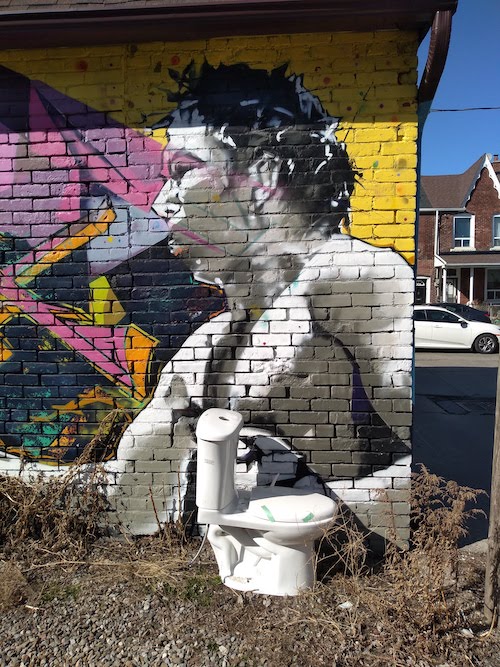
In good news, I have pulled myself off the floor after a week of abject panic. Before I share this week’s gleanings, I wanted to let you know that I wrote a piece for 49thShelf on the strangeness of being unable to read, and also that I created a mini-guide to blogging for kids if you know any who are looking for a creative outlet.
- A person’s tolerance for uncertainty is how well they handle being in a situation with an unclear outcome.
- What I’m trying to say is, if you’re feeling a lot of anxiety over the next few weeks, just turn off your phone and focus on those little details.
- Don’t try to be ‘happy’. Just aim for a steady baseline when you can. Being OK is a much better goal. Happy can be the cherry on the cake. Steady as she/he goes is just great. The odd dip is totally understandable too.
- If my online brand is cute things on the internet and openly available then I guess I will use this time of crisis to recommend resources to get us through.
- Count blessings. Practice gratitude. Do your part, however small it feels.
- Watch out for the bullshit, and whenever you come into contact with it, wash your hands.
- So much is beyond control or management, but clean bedding I can do.
- Who would be shadowing our days and even (it seems) our nights, ambling around outside while we sleep, helping himself to kale and a few succulent ants.
- And at the time, bedrest was all we could do to feel some semblance of control in a situation where we had none.
- I left my Heart in Paris and my Appendix in Berlin
- You don’t really notice how much you count on a guy like Tom Hanks.
- Not to be Outdone, I Rode a Wild Cow in a Rodeo
- Each time I open one up to write, the words don’t come.
- All shall be well and all manner of things shall be well and fingers crossed for the return of the swallows soon and owlets to come.
- When those reserves run low, one of the things we celebrated in the old world that can still replenish our spirits in this new world is a good, inspiring, comforting, diverting book.
- We shouldn’t shut joy out of literature even when – maybe, especially when – we are all too aware that the world is full of troubles. Sometimes it’s important to stand facing the sunshine.
- However does a woman teach herself to be an awesome photographer?
- Once upon a time a tree grew into the wires overhead.
- I’m shaken, as we all are, by how quickly our personal safety and our collective safety has been changed and compromised
- It seems unlikely my book club will be meeting any time soon, but if we were able to, I’m not sure this book would give us that much to talk about.







